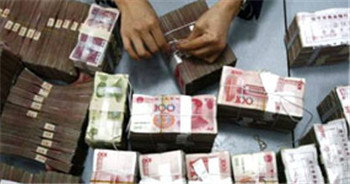(单词翻译:单击)

Li Keqiang did not shirk the issue of currency wars when he spoke to the Financial Times in April.
今年4月接受英国《金融时报》采访时,李克强并未回避货币战的问题。
“We don’t want to see a scenario in which major economies trip over each other to devalue their currencies. That would lead to a currency war,” said China’s premier.
“我们不愿意看见货币竞相贬值的状态出现,那会出现货币大战,”李克强说。
Currency intervention is an issue that has chilled US-China relations for more than a decade and while it has gone quiet of late, it is threatening to resurface.
十多年来,汇率干预一直是一个导致中美关系冷淡的问题。尽管近来沉寂了下来,现在这一问题似乎正再次浮出水面。
China’s equity market shock, which from mid-June saw a wipeout of more than 30 per cent of the value of shares in Chinese companies, prompted a dramatic reaction from Beijing with regulators imposing a six-month ban on share sales by big shareholders.
从6月中旬开始,中国上市公司股票市值蒸发了逾30%,股市暴跌促使北京方面做出激烈回应,监管机构出台了大股东6个月内禁止抛售股票的命令。
As China’s economy slows, could another strident reaction be forthcoming, by depressing the value of the renminbi in order to stimulate trade, in other words a breakout of the very currency war China has pledged not to undertake?
随着中国经济放缓,北京方面是否即将做出另一个激烈回应——通过压低人民币汇率来刺激贸易,换句话说,会不会爆发中国承诺不会挑起的货币大战?
This depends on assessing the fair value of the renminbi. The currency was pegged to the dollar until 2005, since then Beijing has allowed it to rise, except for a two-year period around the global financial crisis.
这取决于对人民币公允价值的评估。直到2005年,人民币一直实行盯住美元的汇率制。此后,除了全球金融危机爆发后的两年,北京方面允许人民币升值。
From the end of the peg to the end of 2013, it rose in value against the dollar by a third.
从停止盯住美元到2013年底,人民币对美元升值了三分之一。
After the dollar hit a low of Rmb6.05, the currency pair has for the past 18 months traded in a band of Rmb6.05 to 6.27.
在美元/人民币汇率触及6.05的低点以后,过去18个月内一直在6.05到6.27的区间内波动。
That, according to Aroop Chatterjee, foreign exchange strategist in Barclays, is where Beijing wants the renminbi to stay for a number of reasons.
巴克莱(Barclays)外汇策略师阿鲁普查特吉(Aroop Chatterjee)认为,出于几个原因,北京方面希望人民币汇率维持在这一区间内。
Chief among them is Beijing’s campaign to be included in Special Drawing Rights, the basket of currencies afforded official reserve currency status by the International Monetary Fund. A decision is expected later this year.
其中最主要的原因是北京方面致力于人民币纳入特别提款权(SDR)。特别提款权是国际货币基金组织(IMF)授予官方储备货币地位的一篮子货币。预计决定将在今年晚些时候做出。
“Part [of the reason for the tight range] is related to the People’s Bank of China’s intention to keep the renminbi stable and a lot of that is related to the potential for destabilising capital outflows,” says Mr Chatterjee.
“(窄幅波动的原因)部分与中国央行有意保持人民币币值稳定有关,而中国央行之所以这样,很大程度上与资本外流造成不稳定的可能性相关,”查特吉表示。
“But there is also the political intent on SDR [special drawing rights]. They want to project a picture of stability to the IMF and the rest of the world.”
“但其中还有关于特别提款权的政治意图。它们希望向IMF和世界其他地方展现出一种稳定的景象。”
For these reasons, several currency strategists expect the renminbi to hang around the level of Rmb6.26 by the end of the year. But Daniel Tenengauzer, emerging markets forex strategist at RBC Capital Markets, demurs. He thinks Beijing will allow the band to widen.
出于这些原因,几名货币策略师预计,到今年年底,美元/人民币汇率会在6.26左右徘徊。但加拿大皇家银行资本市场(RBC Capital Markets)新兴市场外汇策略师丹尼尔礠坲戈泽(Daniel Tenengauzer)提出异议。他认为北京方面将允许这一区间扩大。
“Part of the internationalisation of the renminbi is a widening of the band and a more volatile exchange rate,” he says.
“人民币国际化的一部分是浮动区间的扩大,以及汇率波动性加大,”他表示。
This opens up the debate on the renminbi’s valuation. The International Monetary Fund, in a notable statement in May, declared that it no longer believed the renminbi was undervalued.
这打开了有关人民币估值的辩论。5月,IMF发表了一份令人瞩目的声明,宣称不再认为人民币被低估。
Where the value of the renminbi goes depends on China policy. Mr Gu reckons it will rise if China accepts lower growth and opens its capital account to global investors.
人民币币值走势取决于中国的政策。他认为,如果中国接受更低的增长,并向全球投资者开放资本账户,人民币币值将上升。
But if it chooses to expand fiscal stimulus to support growth and continues to distort investment, he believes the current account surplus will shrink quickly and the renminbi will weaken.
但如果,中国选择扩大财政刺激以支撑增长并继续扭曲投资,他认为经常账户盈余将迅速萎缩,人民币将会走弱。
Ying Gu, Hong Kong-based emerging markets strategist for JPMorgan, agrees, particularly as China’s current account surplus to GDP, an indicator for the currency’s valuation, has fallen to 2.3 per cent.
摩根大通(JPMorgan)驻香港新兴市场策略师Gu Ying也认同这一点,尤其是当前中国经常账户盈余占GDP比例已跌至2.3%,该比例是货币估值的一个指标。
As the dollar strengthens through US Federal Reserve interest rate liberalisation, “I am afraid renminbi will become too expensive”, he says.
随着美元通过美联储(Fed)利率自由化而走强,“我担心人民币将变得过于昂贵,”他表示。
It already is, says Mr Tenengauzer. “A year ago, the currency was at fair value and now it’s 15 per cent overvalued,” he says.
特南戈泽表示,现在人民币已经过于昂贵了。“1年前,该货币价值较为公允,现在已被高估了15%,”他表示。
Mr Chatterjee agrees. “The dollar has appreciated against the rest of the world but the dollar-renminbi pair has gone sideways. The renminbi is quite expensive,” he says.
查特吉认同前者的说法。“美元相对于世界其他地方货币升值,但美元/人民币汇率走势则是横向的。人民币相当昂贵,”他表示。
China’s economy is showing weakness, the country faces deflationary pressures and the shock sell-off in its equity markets points to the government needing to find ways to stabilise growth and minimise risks. Cuts in interest rates are likely.
中国经济正呈现出疲软的态势,该国面临着通缩压力,股市的剧烈抛售表明中国政府需要找到稳定增长和最小化风险的方法。利率下调是有可能的。
Whether that amounts to a currency war is a question of interpretation.
这是否相当于货币战,是一个如何诠释的问题。
“In the near term, the focus is on SDR,” says Mr Chatterjee. “But further down the road, the risk to growth is to the downside. With broader dollar strength, weak growth will lead policymakers to accommodate a weaker exchange rate.
“在近期,重点是特别提款权,”查特吉说,“但再往前发展,增长将面临下行风险。随着美元进一步走强,疲弱的增长将导致政策制定者考虑削弱汇率。”
“If it was the case that the renminbi was moving because of intervention efforts, that would be different. But there are clear signs in capital outflows, in the weak economy and in weak inflation that the macroeconomic backdrop supports a weaker currency.”
“如果人民币的确因为干预而变动,情况将是不同的。但现在资本外流、经济疲软和弱通胀方面都有明显迹象表明,宏观经济背景支持人民币走弱。”


